Indian Coast Guard
| Indian Coast Guard | |
|---|---|
| Bhāratīya Taṭarakṣak | |
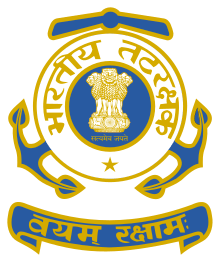 Indian Coast Guard crest | |
| Active | 1978–Present |
| Country | India |
| Type | Coast Guard |
| Size |
15,714 active personnel[1] 175 vessels 44 aircraft |
| Headquarters | New Delhi |
| Motto(s) | वयम् रक्षामः (In Sanskrit: We Protect[2]) |
| Anniversaries | Coast Guard Day: 1 February |
| Vessels |
|
| Website |
www |
| Commanders | |
| Director General | Director General Rajendra Singh, PTM, TM |
| Additional Director General | Additional Director General V. S. R. Murthy, PTM, TM[3] |
| Coast Guard Commander (Western Seaboard) | Additional Director General Krishnaswamy Natarajan, PTM, TM [4] |
| Coast Guard Commander (Eastern Seaboard) | Additional Director General K R Nautiyal, PTM, TM[5] |
| Insignia | |
| Ensign |
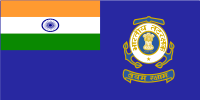 |
| Racing stripe |
 |
| Aircraft flown | |
| Helicopter | HAL Dhruv |
| Patrol | Dornier Do 228 |
The Indian Coast Guard (ICG) protects India's maritime interests and enforces maritime law, with jurisdiction over the territorial waters of India, including its contiguous zone and exclusive economic zone. The Indian Coast Guard was formally established on 18 August 1978 by the Coast Guard Act, 1978 of the Parliament of India as an independent Armed force of India. It operates under the Ministry of Defence.[6]
The Coast Guard works in close cooperation with the Indian Navy, the Department of Fisheries, the Department of Revenue (Customs) and the Central and State police forces.
History
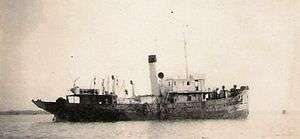
The establishment of the Indian Coast Guard was first proposed by the Indian Navy to provide non-military maritime services to the nation.[7] In the 1960s, sea-borne smuggling of goods was threatening India's domestic economy. The Indian Customs Department frequently called upon the Indian Navy for assistance with patrol and interception in the anti-smuggling effort.
The Nagchaudhuri Committee was constituted with participation from the Indian Navy and the Indian Air Force to study the problem. In August 1971, the committee identified the requirement to patrol India's vast coastline, set up a registry of offshore fishing vessels in order to identify illegal activity, and establish a capable and well-equipped force to intercept vessels engaged in illegal activities. The committee also looked at the number and nature of the equipment, infrastructure and personnel required to provide those services.[7]
By 1973, India had started a programme to acquire the equipment and started deputing personnel from the Indian Navy for these anti-smuggling and law enforcement tasks, under the provisions of the Maintenance of Internal Security Act. The Indian Navy sensed that the law enforcement nature of these duties diverged from its core mission as a military service. Admiral Sourendra Nath Kohli, then Chief of Naval Staff, hence made a recommendation to the Defence Secretary outlining the need for a separate maritime service to undertake those duties and offering the Navy's assistance in its establishment. On 31 August 1974, the Defence Secretary submitted a note to the Cabinet Secretary proposing cabinet action on Admiral Kohli's recommendation.
As a result, in September 1974, the Indian cabinet set up the Rustamji Committee, under the chairmanship of Khusro Faramurz Rustamji, with participation from the Navy, the Air Force and the Department of Revenue to examine gaps in security and law enforcement between the roles of the Indian Navy and the central and state police forces. The discovery of oil off Bombay High further emphasised the need for a maritime law enforcement and protection service. The committee submitted its recommendation for the establishment of the Indian Coast Guard under the Ministry of Defence on 31 July 1975. Bureaucratic wrangling followed, with the Cabinet Secretary making a recommendation to place the service under the Ministry of Home Affairs. Then Prime Minister Indira Gandhi overruled the Cabinet Secretary and decided to accept the original recommendation of the Rustamji Committee to place the service under the Ministry of Defence.[7]
An interim Indian Coast Guard came into being on 1 February 1977, equipped with two small corvettes and five patrol boats transferred from the Navy. The duties and functions of the service were formally defined in the Coast Guard Act, which was passed by India's parliament on 18 August 1978 and came into immediate effect.
Vice Admiral V A Kamath of the Indian Navy was appointed the founding Director-General. Prime Minister Morarji Desai inspected the Guard of Honour at the service's inauguration. Vice Admiral Kamath proposed a five-year plan to develop the ICG into a potent force by 1984, but the full potential of this plan was not immediately realised due to an economic resource crunch.[7]
One of the historic operational successes of the ICG occurred in October 1999, with the recapture at high seas of a Panamanian-registered Japanese cargo ship, MV Alondra Rainbow, hijacked off Indonesia. Her crew were rescued off Phuket, Thailand. The ship had been repainted as MV Mega Rama, and was spotted off Kochi, heading towards Pakistan. She was chased by ICGS Tarabai and INS Prahar (K98) of the Indian Navy, and apprehended.[8] It was the first successful prosecution of armed pirates in over a century.
.jpg)
The Indian Coast Guard conducts exercises with the other coast guards of the world. In May 2005, the ICG agreed to establish liaison links with Pakistan's Maritime Security Agency (PMSA). In 2006, the Indian Coast Guard conducted exercises with its Japanese and Korean counterparts.
After the 2008 Mumbai attacks, the Indian government initiated a programme to expand the ICG force, assets and infrastructure. The force aims to have 150 ships and 100 twin-engined aircraft by 2020 in its fleet.[9]
Present scenario
Current role

The Indian Coast Guard's motto is "वयम रक्षामः" (Vayam Rakshamah), which translates from Sanskrit as "We Protect".
Missions of Indian Coast Guard:[10]
- Safety and protection of artificial islands, offshore terminals and other installations
- Protection and assistance to fishermen and mariners at sea
- Preservation and protection of marine ecology and environment including pollution control
- Assistance to the Department of Customs and other authorities in anti-smuggling operations
- Law enforcement in territorial as well as international waters
- Scientific data collection and support
- National defence during hostilities (under the operational control of the Indian Navy)
Additional responsibilities of the Indian Coast Guard:[11]
- Offshore Security Coordination Committee (OSCC) – The Director-General of the Indian Coast Guard is the Chairman of OSCC constituted by the Ministry of Petroleum and Natural Gas (MoPNG).
- National Maritime Search and Rescue Coordinating Authority (NMSARCA) – The Director-General of the Indian Coast Guard is the NMSARCA for executing / coordinating search and rescue (SAR) missions
- Lead Intelligence Agency (LIA) – For coastal and sea borders
- Coastal Security – The Director-General of the Indian Coast Guard is the commander of coastal command and is responsible for overall coordination between central and state agencies in all matters relating to coastal security
Leadership and organisation
The Indian Coast Guard organisation is headed by the Director-General (DG ICG) who is located at Coast Guard Headquarters (CGHQ), New Delhi. At CGHQ, he is assisted by four Deputy Director-Generals of the rank of Inspector-General, and other senior officers heading various staff divisions. The current Director-General is Rajendra Singh, PTM, TM.[12]
The Indian Coast Guard has recently got its first three-star rank officer DG Rajendra Singh Director general, PTM, TM, who has the distinction of being the first regular direct entry officer of the Indian Coast Guard to be promoted to the rank of DG on 11 January 2013. Director-General of Indian Coast Guard is equivalent to Vice Admiral of Indian Navy.[13]
The Indian Coast Guard operates five regions. Each region is headed by an officer of the rank of Inspector-General. Each of the regions is further divided into multiple districts, typically covering a coastal state or a union territory.
| Coast Guard regions | Regional HQ location | Regional commander |
|---|---|---|
| Western Region (W) | Mumbai | IG Vijay Chafekar PTM, TM[14] |
| Eastern Region (E) | Chennai | IG Paresh Sivamani, TM[15][16] |
| North-East Region (NE) | Kolkata | IG Rajan Bargotra, TM[17] |
| Andaman & Nicobar Region (A&N) | Port Blair | IG K R Suresh, TM[18] |
| North-West Region (NW) | Gandhinagar | IG Maneesh V Pathak[19] |
By the end of 2012, the Indian Coast Guard is on track to operate:[20]
- 42 Coast Guard Stations
- 5 Coast Guard Air Stations
- 10 Coast Guard Air Enclaves
List of Coast Guard Stations
There are currently 42 Coast Guard stations which have been established along the coastline of the country. Presently, there is no proposal for setting-up more Coast Guard Stations.[21]
| Regional HQ | District HQ | Coast Guard Station |
|---|---|---|
| North-East Region (NE) CGRHQ Kolkata | CGAE Kolkata | |
| ICGS Kolkata | ||
| DHQ-7 Paradip | CGAE Bhubaneswar | |
| ICGS Gopalpur | ||
| DHQ-8 Haldia | ICGS Frazerganj | |
| Eastern Region (E) CGRHQ Chennai | DHQ-13 Puducherry | ICGS Thoothukudi |
| ICGS Mandapam | ||
| ICGS Puducherry | ||
| DHQ-5 Chennai | CGAS Chennai | |
| ICGS Karaikal | ||
| DHQ-6 Visakhapatnam | ICGS Kakinada | |
| ICGS Nizampatnam[22] | ||
| ICGS Krishnapatnam | ||
| CGAE Visakhapatnam (Proposed)[23][24] | ||
| Andaman & Nicobar Region (A&N) CGRHQ Port Blair | CGAE Port Blair | |
| DHQ-14 Port Blair | ICGS Port Blair | |
| ICGS Hutbay | ||
| DHQ-9 Diglipur | ICGS Mayabunder[25] | |
| ICGS Diglipur | ||
| DHQ-10 Campbell Bay | ICGS Campbell Bay | |
| ICGS Kamorta | ||
| Western Region (W) CGRHQ Mumbai | DHQ-3 New Mangaluru | ICGS Karwar[26] |
| CGAE New Mangaluru[27] | ||
| DHQ-2 Mumbai | ICGS Murud Janjira | |
| ICGS Ratnagiri | ||
| ICGS Dahanu | ||
| DHQ-4 Kochi | ICGS Vizhinjam | |
| ICGS Beypore | ||
| CGAE Kochi | ||
| DHQ-11 Goa | ICGS Goa | |
| CGAE Goa | ||
| DHQ-12 Kavaratti | ICGS Kavaratti | |
| ICGS Minicoy | ||
| ICGS Androth | ||
| CGAS Daman | ||
| North-West Region (NW) CGRHQ Gandhinagar | ICGS Gandhinagar | |
| DHQ-1 Porbandar | ICGS Pipavav | |
| ICGS Jakhau | ||
| ICGS Mundra | ||
| ICGS Veraval | ||
| ICGS Vadinar | ||
| ICGS Okha | ||
| CGAE Porbandar |
Personnel
Officer Rank Structure
A table showing the rank structure of Coast Guard officers with those of the other Indian armed services.
| Indian Coast Guard Ranks | Indian Army Ranks | Indian Navy Ranks | Indian Air Force Ranks |
|---|---|---|---|
| Director-General | Lieutenant General | Vice Admiral | Air Marshal |
| Special Director-General | Lieutenant General | Vice Admiral | Air Marshal |
| Additional Director-General | Lieutenant General | Vice Admiral | Air Marshal |
| Inspector-General | Major General | Rear Admiral | Air Vice Marshal |
| Deputy Inspector-General | Brigadier | Commodore | Air Commodore |
| Commandant | Colonel | Captain | Group Captain |
| Commandant (Junior Grade) | Lt Colonel | Commander | Wing Commander |
| Deputy Commandant | Major | Lt Commander | Sqdn Leader |
| Assistant Commandant (2 Years) | Captain | Lieutenant | Flight Lieutenant |
| Assistant Commandant | Lieutenant | Sub Lieutenant | Flying Officer |
Ranks and Insignia of Indian Coast Guard Officers
| Shoulder Insignia |  |
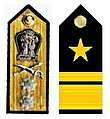 |
 |
 |
 |
 |
 |
 |
| Rank | Director General | Inspector General | Dy. Inspector General | Commandant | Commandant (Junior Grade) | Deputy Commandant | Asst Commandant (2 Years) | Assistant Commandant |
Coast Guard Officers
The naming of ranks of officers in the Coast Guard is as same as rank of Central Armed Police Forces. Officers are commissioned in the Coast Guard in one of four branches, as either General-Duty officer, Pilot officer, Technical officer or Law officers. Lady Officers have two branches i.e. General-Duty Officer or Pilot Officer and serve on shore establishments/Air Stations/Headquarters. They are not deployed on board Indian Coast Guard ships. Currently, officers of Indian Coast Guard undergo Basic Military Training at the Indian Naval Academy, Ezhimala along with their counterparts of Indian Navy. This helps in the mutual interchange of Officers among these two sister services. While the Indian Coast Guard Academy is under construction in Azhikkal, Kannur district, Kerala.[28]
General-Duty Officers
The command of ships at sea can only be exercised by officers of the General-Duty (GD) branch. The key functions of a General-Duty Officer would be to operate weapons, sensors and different kinds of equipment on board a ship. The safety of the ship and the men would be GD officers responsibility. All the District Commanders (COMDIS) and Commander of Coast Guard Region (COMCG) appointments are exercised by a GD Officer of the Indian Coast Guard.
Pilot Officers
Pilot Officers are also part of GD branch. A Pilot Officer gets an opportunity to work at shore Air Stations along the Indian coasts and also embark ships. ICG operates fixed wing aircraft for surveillance of the Exclusive Economic Zone. In addition, helicopters are embarked on Coast Guard Offshore Patrol Vessels (OPV) to provide local surveillance and perform search and rescue mission at sea.
Technical Officers
Technical Officers are responsible for operation of advanced technology and sensor systems on board Coast Guard vessels and aircraft, as well as on shore installations. They also command the maintenance wings of the force.
Law Officers
Law Officers act as legal advisers to their respective commanders. They represent the Indian Coast Guard in legal actions filed by or against the organisation. They also perform the duties of trial law officers in Coast Guard courts, convened to try delinquent Coast Guard personnel. The Directorate of Law at Coast Guard Headquarters is headed by a Deputy Inspector-General and is designated as the Chief Law Officer.
Enrolled personnel
Enrolled personnel in the Coast Guard serve as either a yantrik (technician) or navik (sailor).[29]
- Yantriks are responsible for operating and maintaining mechanical, electrical or aeronautical equipment and systems on board the Coast Guard vessels and aircraft.
- Naviks may further serve in the General-Duty or Domestic branches. The General-Duty naviks serve as sailors, weapons systems operators, communication specialists, divers, etc. or in specific maritime or aviation support roles. Domestic branch naviks serve in roles such as stewards, cooks, etc. on board Coast Guard vessels.
Enrolled personnel of Indian Coast Guard are trained along with Indian Naval sailors at the naval training establishment INS Chilka. All training undertaken by Coast Guard personnel is the same as those undertaken by sailors in the Indian Navy. All personnel are trained in operation of weapons systems in cases of emergency.
Equipment
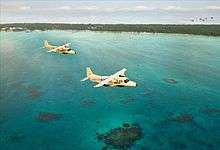
.jpg)
Current aircraft
The Indian Coast Guard operates a fleet of:[30]
- 23 Dornier Do 228 maritime surveillance aircraft
- 4 HAL Dhruv utility helicopters
- 17 HAL Chetak utility helicopters
Current vessels
Vessels belonging to the Indian Coast Guard bear the prefix "ICGS" – Indian Coast Guard Ship.
| Class | Picture | Origin | Type | Commissioned | Displacement | Vessels | Comment |
|---|---|---|---|---|---|---|---|
| Pollution control vessels (3) | |||||||
| Samudra class | 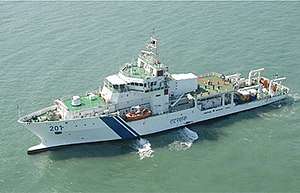 |
Pollution control vessel | 2010–present | 3,300 tons | 3 | ||
| Offshore patrol vessels (18) | |||||||
| Vikram class | Offshore patrol vessel | 2018–present | 2,140 tons | 2 | A total of 7 vessels on order.[31][32] | ||
| Samarth class | 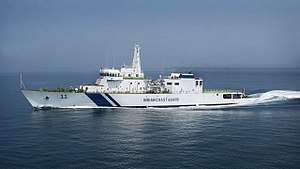 |
Offshore patrol vessel | 2015–present | 2,400 tons | 6 | A follow-on order for 5 more vessels was place in August 2016.[33] | |
| Vishwast class | 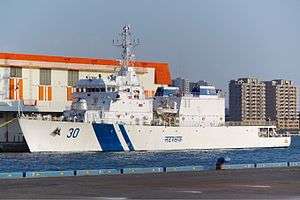 | Offshore patrol vessel | 2010–present | 1,800 tons | 3 | ||
| Sankalp class | 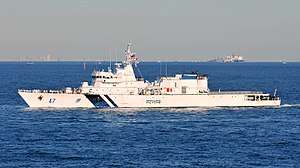 |
Offshore patrol vessel | 2008–present | 2,325 tons | 2 | As per ICG website[34] | |
| Samar class | _and_Samar_(42).jpg) | Offshore patrol vessel | 1996–present | 2,300 tons | 4 | ||
| Vikram class | 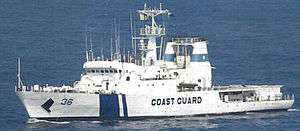 | Offshore patrol vessel | 1983–present | 1,220 tons | 1 | 5 decommissioned, 1 lost, 2 transferred | |
| Fast Patrol vessels (42) | |||||||
| Aadesh class | 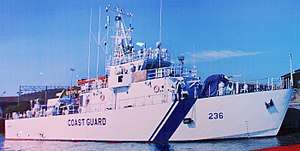 | Fast patrol vessel | 2013–present | 290 tons | 20 | ||
| Rajshree class | Fast patrol vessel | 2012–present | 275 tons | 8 | A follow-up order of 5 more ships was placed with deliveries starting in mid-2018.[35] | ||
| Rani Abbaka class | 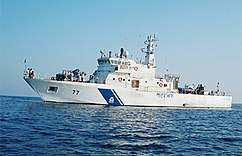 |
Fast patrol vessel | 2009–present | 275 tons | 5 | Additional 8, ordered in Phase 2, are under construction.[36][37] | |
| Sarojini Naidu class |  | Fast patrol vessel | 2002–present | 270 tons | 7 | ||
| Priyadarshini class |  |
Fast patrol vessel | 1992–present | 215 tons | 2 | 5 decommissioned[38] | |
| Patrol boats (68) | |||||||
| Bharati class |  | Patrol boat | 2013–present | 107 tons | 6 | 9 more to be commissioned | |
| L&T class | Fast interceptor boat | 2012–present | 90 tons | 40 | A total of 54 are planned | ||
| ABG class |  | Fast interceptor boat | 2000–present | 90 tons | 13 | ||
| AMP class | Interceptor boat | 1993–present | 44 tons | 5 | 4 decommissioned. 1 leased to Mauritius. | ||
| Swallow Craft class | Inshore patrol boat | 1980–present | 32 tons | 4 | 2 decommissioned. 2 stricken. | ||
| Patrol craft (27) | |||||||
| Timblo class | Interceptor craft | 2010–present | 7 tons | 10 | |||
| Bristol class | Interceptor craft | 2004–present | 5 tons | 4 | |||
| Vadyar class | Interceptor craft | 1988–present | 2 tons | 8 | |||
| Mandovi Marine class | Patrol boat | 1980s-present? | 10 tons | 5? | Status unknown. | ||
| Hovercraft (18) | |||||||
| Griffon class | 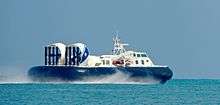 | Hovercraft | 2000–present | 27 tons | 18 | 6 H-181(Griffon 8000TD) and 12 H-187(Griffon 8000TD)[39] | |
Former vessels
Vessels belonging to the Indian Coast Guard bear the prefix "ICGS" – Indian Coast Guard Ship.
| Class | Picture | Origin | Type | Commissioned | Displacement | Vessels | Comment |
|---|---|---|---|---|---|---|---|
| Patrol vessels (11) | |||||||
| Tara Bai class | Coastal patrol vessel | 1987–2014 | 236 tons | 0 | All 6 have been decommissioned.[36] | ||
| Rajhans class | Patrol vessel | 1980–2016 | 200 tons | 0 | All 5 have been decommissioned.[40] | ||
Future of the Indian Coast Guard
Future vessels
The following is a table of vessel classes which are either under construction or planned, but have not yet entered service.
| Class | Origin | Type | Commission (est.) | Displacement | Planned | Comment |
|---|---|---|---|---|---|---|
| Reliance class | Fast patrol vessel | January 2019 | 14 | Contract was signed for $138 million[41][42][43] | ||
| Reliance-class training ship | Training vessel | 1 | [44] |
See also
References
- ↑ http://pib.nic.in/newsite/erelease.aspx?relid=(Release Archived 18 October 2016 at the Wayback Machine. ID :154791)
- ↑ "Grammar Tutorial ::: Reference – Verb Forms / धारुरूप / dhaaturuupa". Archived from the original on 10 March 2016.
- ↑ "Archived copy". Archived from the original on 12 March 2017. Retrieved 10 September 2016.
- ↑ "Archived copy". Archived from the original on 5 January 2016. Retrieved 10 September 2016.
- ↑ http://www.newindianexpress.com/nation/2018/apr/11/vijay-chafekar-is-new-flag-officer-of-indian-coast-guard-west-1799997.html
- ↑ "About the Ministry". Ministry of Defence, Government of India. Archived from the original on 9 May 2012. Retrieved 3 May 2012.
- 1 2 3 4 "History:Indian Coast Guard". indiancoastguard.gov.in. Archived from the original on 6 August 2016. Retrieved 25 July 2016.
- ↑ "Alondra Rainbow revisited, A Study of related issues in the light of the recent judgment of Mumbai High Court". South Asia Analysis Group. 13 May 2005. Archived from the original on 28 November 2010. Retrieved 3 May 2012.
- ↑ "Indian Coast Guard aims to have 150 ships, 100 aircraft by 2020". Archived from the original on 27 February 2016. Retrieved 5 January 2016.
- ↑ "Mission & Motto:Indian Coast Guard". indiancoastguard.gov.in. Archived from the original on 16 July 2016. Retrieved 25 July 2016.
- ↑ "Archived copy" (PDF). Archived from the original (PDF) on 27 April 2014. Retrieved 17 September 2013.
- ↑ "Indian Coast Guard". Archived from the original on 27 December 2014. Retrieved 26 November 2014.
- ↑ "Indian Coast Guard Gets First 3-Star officer". Archived from the original on 23 September 2015. Retrieved 26 November 2014.
- ↑ "Vijay Chafekar is new Flag Officer of Indian Coast Guard West". The New Indian Express. Retrieved 2018-04-11.
- ↑ "Regional Commander:Indian Coast Guard". indiancoastguard.gov.in. Retrieved 2018-08-11.
- ↑ "Paramesh Sivamani takes over as commander of Coast Guard Eastern Region - Times of India". The Times of India. Retrieved 2018-08-11.
- ↑ "Regional Commander:Indian Coast Guard". indiancoastguard.gov.in. Retrieved 2018-08-11.
- ↑ "Regional Commander:Indian Coast Guard". www.indiancoastguard.gov.in. Archived from the original on 29 June 2016. Retrieved 27 May 2016.
- ↑ "Regional Commander:Indian Coast Guard". indiancoastguard.gov.in. Retrieved 2018-08-11.
- ↑ "The Indian Coast Guard – "Committed to Serve – Making a Difference"". Press Information Bureau, Government of India. Archived from the original on 1 September 2012. Retrieved 3 May 2012.
- ↑ "Press Information Bureau". Archived from the original on 6 May 2016. Retrieved 7 May 2016.
- ↑ "Indian Coast Guard station commissioned at Nizampatnam". The Hindu. 26 November 2014. ISSN 0971-751X. Archived from the original on 29 November 2014. Retrieved 28 December 2015.
- ↑ "Coast Guard to Set Up Air-enclave in Vishakapatnam". The New Indian Express. Archived from the original on 1 February 2016. Retrieved 3 February 2016.
- ↑ "Visakhapatnam to have Indian Coast Guard air enclave by 2018-end - Times of India". The Times of India. Archived from the original on 12 February 2017. Retrieved 10 February 2017.
- ↑ "India Opens New Coast Guard Station In Andaman". www.defencenow.com. Archived from the original on 22 January 2016. Retrieved 28 December 2015.
- ↑ "Indian Coast Guard Station at Karwar Commissioned". www.marinebuzz.com. Archived from the original on 6 March 2016. Retrieved 28 December 2015.
- ↑ "Coast Guard District HQ 3 to set up RRT – Times of India". Archived from the original on 29 May 2016. Retrieved 10 September 2016.
- ↑ "First Coast Guard academy in Kannur". The Hindu. 28 February 2011. Archived from the original on 8 November 2012. Retrieved 3 May 2012.
- ↑ "Careers in Indian Coast Guard". Indian Coast Guard. Archived from the original on 2 May 2012. Retrieved 3 May 2012.
- ↑ (Iiss), The International Institute of Strategic Studies (2017-02-14). The Military Balance 2017. Routledge, Chapman & Hall, Incorporated. ISBN 9781857439007.
- ↑ "L&T bags Rs 1,432 cr defence order". The Hindu Business Line. Archived from the original on 27 August 2017. Retrieved 4 January 2016.
- ↑ "India commissions first new Vikram-class OPV". www.janes.com. Retrieved 2018-04-11.
- ↑ "Goa Shipyard set to build five new OPVs for Indian Coast Guard | IHS Jane's 360". www.janes.com. Archived from the original on 8 September 2016. Retrieved 9 September 2016.
- ↑ "Surface Units Page :Indian Coast Guard". www.indiancoastguard.gov.in. Archived from the original on 3 June 2016. Retrieved 1 May 2016.
- ↑ "GRSE to build water jet-propelled fast patrol vessel for Coast Guard". The Economic Times. Archived from the original on 27 August 2017. Retrieved 15 May 2017.
- 1 2 "Indian Coast Guard: Inshore Patrol Vessels by Hindustan Shipyard Limited". www.marinebuzz.com. Archived from the original on 29 January 2016. Retrieved 28 December 2015.
- ↑ "India commissions third Rani Abbakka-class inshore patrol vessel". IHS Jane's Defense and Secturity. 7 July 2015. Archived from the original on 9 July 2015. Retrieved 7 July 2015.
- ↑ "Surface Units Page :Indian Coast Guard". www.indiancoastguard.gov.in. Archived from the original on 3 June 2016. Retrieved 1 May 2016.
- ↑ (Iiss), The International Institute of Strategic Studies (2017-02-14). The Military Balance 2017. Routledge, Chapman & Hall, Incorporated. ISBN 9781857439007.
- ↑ "Surface Units Page :Indian Coast Guard". www.indiancoastguard.gov.in. Archived from the original on 3 June 2016. Retrieved 1 May 2016.
- ↑ IANS (30 January 2017). "Reliance Defence bags Rs 916 crore contract from Indian Coast Guard". Business Standard India. Archived from the original on 2 February 2017. Retrieved 30 January 2017.
- ↑ "Pipavav Defence secures order for building 14 coast guard vessels". http://www.livemint.com/. Archived from the original on 11 August 2016. Retrieved 27 December 2015. External link in
|website=(help) - ↑ Sputnik. "In a Bid for Defense Exports, India is Giving Contracts to the Private Sector". sputniknews.com. Archived from the original on 25 August 2017. Retrieved 30 January 2017.
- ↑ "Pipavav Defence wins Rs 221 cr order from Indian Coast Guard". Archived from the original on 5 January 2016. Retrieved 27 December 2015.
External links
| Wikimedia Commons has media related to Indian Coast Guard. |
- Official website
- Ministry of Defence site
- Indian Coast Guard orders six Griffon hovercraft
- Indian Coast Guard Recruitment Website
